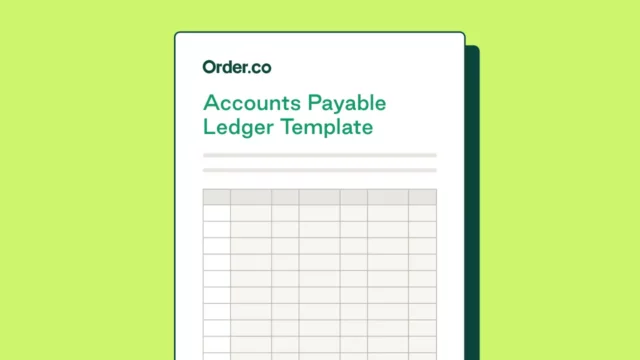What Is Trade Accounts Payable, and Why Is It Critical for Managing Vendor Relations?

What Is Trade Accounts Payable, and Why Is It Critical for Managing Vendor Relations?
Ask any modern business decision-makers about the essence of trade accounts payable, and you'll soon realize that it's one of the greatest tasks they face. After all, businesses must pay their debts, and they cannot afford to get this wrong.
Managing invoices accurately and promptly is almost an art, and it’s the key to maintaining good vendor relationships. It's essential to understand the critical relationship between trade accounts payable and vendor relations and its impact on your company's bottom line.
In this article, we'll look at:
- What are trade accounts payable?
- How trade accounts payables are intertwined with procurement and vendor relations
- Managing the accounts payable process and its effect on profitability
- Why trade accounts payable matters
Download the free tool: AP Ledger Template
What are trade accounts payable?
Trade accounts payable (also called trades payable) refers to an amount that suppliers bill a company for delivering goods or providing services in the ordinary cause of business. When paid on credit, the company enters the billed amounts in the accounts payable module of their accounting software or balance sheet.
Any amounts owed to suppliers that the company immediately pays in cash are not part of trade account payables since they are not a liability. In the accounting system, businesses record trade accounts payables in a separate accounts payable account. They also credit the accounts payable account and debit whichever account closely represents the payment's nature, such as an asset or an expense.
It is worth noting that the classification of trade accounts payables is ‘current liabilities’ since they are payable within a year. When that's not the case, the business can classify the trades payables as long-term liabilities. Since long-term liabilities tend to have an attached interest payment, the accountant is more likely to classify them as long-term debt.
Trades payable vs. non-trades payable
One significant difference between the two is that you usually enter trades payable into the accounting system through a special module that automatically generates the required accounting entries. On the other hand, you typically enter non-trades payable into the system using a journal entry.
Trades payable vs. accounts payable
It's normal for some people to use the two phrases interchangeably, but they have a slight but important difference. Trades payable refers to the money you owe vendors for inventory-related goods — for example, business supplies or inventory. On the other hand, accounts payable include all your short-term debts or obligations, including trade payables.
How is trade accounts payable intertwined with procurement and vendor relations?
Traditionally, your procurement department is responsible for maintaining vendor relationships, including contract negotiations, the pursuit of discounting opportunities, compliance to terms, and repayment processes.
Still, it is essential to know that the trade accounts payable process also plays a crucial role in the daily business mechanisms to keep vendor relationships on a positive track.
Research reveals that 47% of companies pay one in ten invoices late, while 16% admit that they pay one in five invoices late. Only a paltry 5% of businesses assert that they always pay their obligations on time, whereas one in 12 firms never monitors its payments processes at all.
Late vendor payments risk causing disruptions in the supply chain and cash flow. Some of the causes of late invoice payments include lack of automation, slow internal processes, lack of capacity to manage invoice volume, and administrative error. Unfortunately, all these are mere excuses for poor performance. Besides, vendors shouldn't have to accommodate internal process flaws.
Supporting a strong, continuous supply chain
Business vendors are crucial to your company's success. Consider, for example, the retail and manufacturing sectors. Regular business relies on vendors to provide the necessary products, parts, and raw materials to complete their end offering. As such, these companies can't afford to lose their key vendors due to inefficient trade accounts payable processes resulting in late, lost, or faulty payments.
Automating your accounts payable workflow speeds up invoice processing and ensures your vendors receive payments accurately and on time. In return, vendors are likely to deliver goods swiftly and offer future discount opportunities.
47% of companies pay one in ten invoices late, while 16% admit that they pay one in five invoices late.
Profitability impact of trade accounts payable management
Just like other current assets or liabilities, trade accounts payable have a significant impact on your profitability. The single most critical thing you can ever do to maintain good vendor relations is pay your bills on time. Unfortunately, accounts payable management can get hectic and unwieldy. As your business grows, so does its suppliers and the invoices you have to pay.
Good vendor relationship management requires a mutually beneficial relationship between you and each supplier or vendor. A positive relationship is a win-win for all parties. Vendors will cut you good deals, suggest new and better products, and work with you on delivery policies and times.
It is prudent to cultivate good supplier relationships because they also mean increased company efficiency. To do this, always ensure that you:
- Pay your bills on time.
- Don't cut off suppliers without a valid reason.
- Keep open lines of communication.
- Elicit trust with all of your vendors and suppliers, regardless of how many you have.
In return, a good vendor could respond by offering you their best trade credit terms possible, hence maximizing your profitability.
One critical metric in any business's financial management process is its cash flow, which comes from business operations like financing and investing. It's worth noting that you generate profit from sales after paying all expenses.
Inadequate monthly cash flow means you won't have enough cash at hand to pay your bills on time, which means trouble with your suppliers. Often, vendors offer cash discounts if businesses pay within a specified number of days, like three months. That discount can have a significantly positive effect on your profitability.
Now, imagine getting cash discounts from all of your vendors and having enough cash on hand to take them. It will result in a significant effect on your net profit margin.
Why accounts payable management matters
The accounts payable management process focuses on ensuring that you pay your bills timely without choking cash flow. It further ensures you have sufficient liquidity to fund process optimization, investment opportunities, and product innovation to reduce your ongoing costs.
It's critical to optimize your accounts payable management, particularly for small business owners who rely heavily on their working capital compared to larger companies. Below are some reasons why accounts payable matter:
- Accurate and efficient workflows in your trade accounts payable system provide transparency and accuracy in your cash flow tracking and planning.
- Better cash flow management allows for more accurate budgeting.
- Effective management provides actionable insights that you can leverage to enhance contract negotiations and strategic sourcing. It also allows you to build stronger vendor relationships that give you access to better discount payment terms.
How do you audit trade payables?
The best practice to follow is to review the recorded cash disbursements subsequent to the corresponding balance sheet date. It allows you to determine which period to apply the related payables and whether it belongs to the previous one. Identifying unrecorded trade accounts payable enables you to manage all your current liabilities. You can also make payments on time to safeguard your vendor relations.
Trade accounts payable is among the essential tasks to get right. The risks of failure are too significant to leave to chance. A poor trade accounts payable process can damage your vendor relations and open you up to fraud risk.
Order.co helps finance and operations teams spend less time placing and managing orders. Peloton, Hugo Boss, XpresSpa, SoulCycle, and WeWork all use Order.co to:
- Place orders from one cart and approved catalog automatically across every vendor.
- Track real-time spending.
- Make actionable purchasing decisions.
Order.co automates your purchase orders, tracks delivery issues, saves you money, offers spend tagging and visibility, consolidates billing and vendor transactions, and unifies all your trade accounts payable data under one platform. To get started, schedule a free demo today.
Get started
"*" indicates required fields



